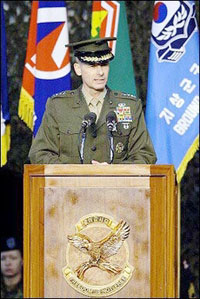|
US says risk of war with China diminishing
(AFP)
Updated: 2006-02-03 20:03
SEOUL - The chairman of the US Joint Chiefs of Staff said that the risk of
war with China was diminishing with the growth of economic ties between the
emerging superpower and the United States.

General Peter Pace,
chairman of the US Joint chiefs of staff, speaks during a change of
command ceremony at Collier Field House, a US military base, in Seoul on
February 3, 1006. Pace said that the risk of war with China was
diminishing with the growth of economic ties between the emerging
superpower and the United States. [AFP] | Despite
concern over Beijing's rapid military build-up and tension in the Taiwan
Strait, General Peter Pace said Washington and Beijing had more shared interests
than differences.
"I am optimistic about the future with regard to China. There is much more
that the two countries have in common than we have not in common," said Pace,
the top military advisor to Defense Secretary Donald Rumsfeld on Friday.
"As we continue to build the economic bridges between the two countries and
as each country becomes more and more dependent on the other for prosperity,
when you do that you lessen significantly any probability of military
complications," he said.
A Pentagon report last year estimated China's defense spending at two to
three times greater than acknowledged by Beijing, or up to 90 billion dollars
for the year.
Last month Japan identified China as a military threat because of its opaque
military spending.
Pace, a Marine Corps officer who took over as chairman of the joint chiefs
last year, said it was the military's job to identify the capabilities it would
need for future events.
"You do not focus on countries but on potential capabilities that you will
need, and then build to that," he said.
He said that on North Korea, Washington needed to look at the country's
fighting capabilities which included an army of 1.2 million troops and "be
prepared to counter that overwhelmingly."
He said a transformation of the US-South Korea alliance was in progress,
including reducing US forces in South Korea from 37,000 to 25,000 by 2008 and
withdrawing them from the border with North Korea to bases south of Seoul.
He said it was hard to be certain of North Korea's intent, but "you need to
be prepared if their intent is ill."
"We are fully capable today of defeating any North
Korean aggression and we will maintain that capacity," he said.
|